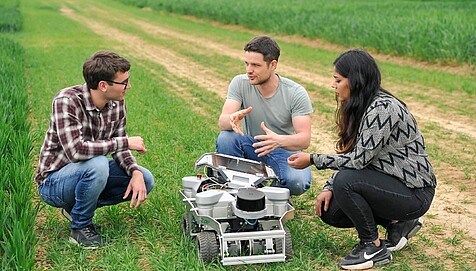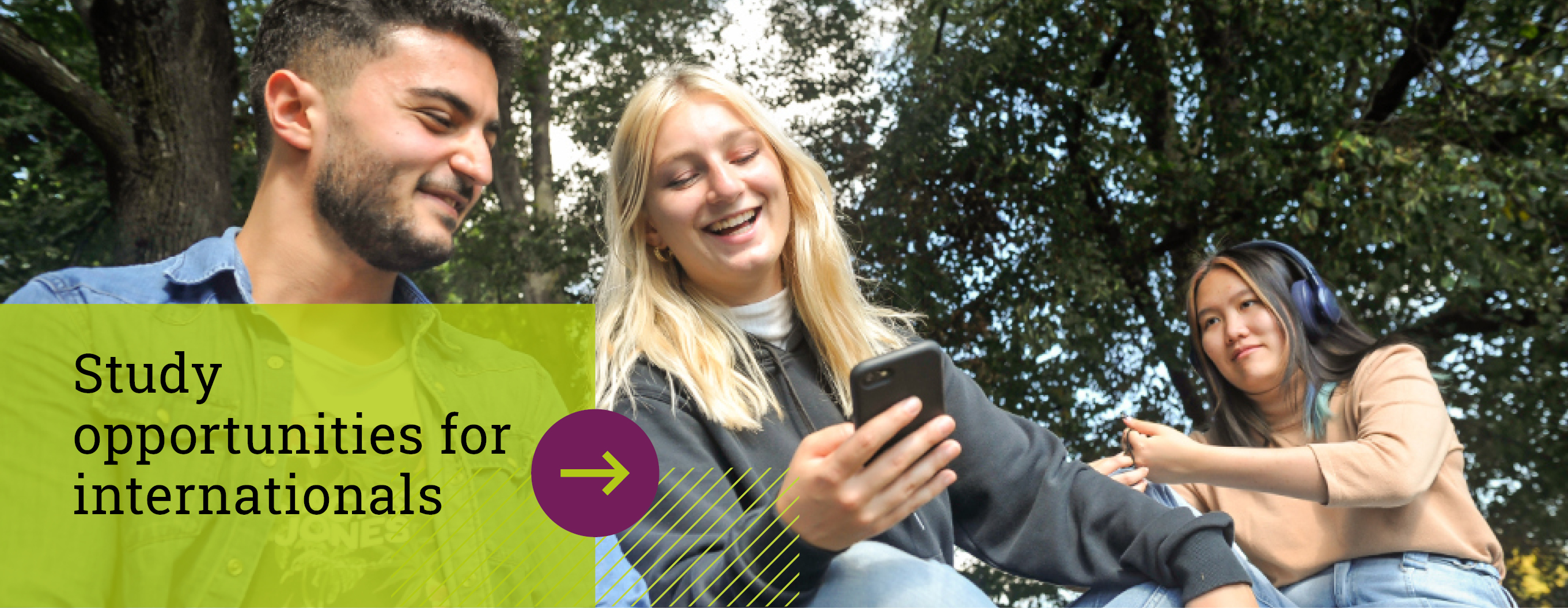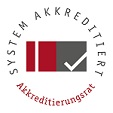Agricultural Engineering
Playing a practical role in the agricultural technology of the future
Agricultural Sciences (Master’s)
Major: Agricultural Engineering
Playing a practical role in the agricultural technology of the future
If you would like to help shape current transformation processes in agriculture and future agricultural production from a technical perspective and are interested in technology and artificial intelligence (AI), then the Agricultural Engineering major, which is only offered at Hohenheim, is perfect for you. It covers all technical and structural production processes in agriculture. These include mechanical and engineering fundamentals, measurement and control technology, AI methods and applications, process engineering in plant production and animal husbandry systems, as well as the function and management of machines and technical systems.
What you can expect:
- We will help you develop and explore the topics that are important to you.
- The Agricultural Engineering major only exists in this form in Hohenheim.
- Benefit from close collaboration with national and international companies
- Take advantage of the variety of courses offered in Hohenheim, with over 250 modules at the Master's level.
- Incorporate aspects relating to sustainability, social and economic relevance as well as the environmental and ethical consequences of agricultural sciences seamlessly into your studies
- You can prepare yourself for interesting and varied jobs in the agricultural engineering sector, including with internships
- Reasons to choose Hohenheim
| Degree Master of Science | 4 semesters 120 Credits | Language of instruction Deutsch | German | University places unlimited | Location Stuttgart | |||||
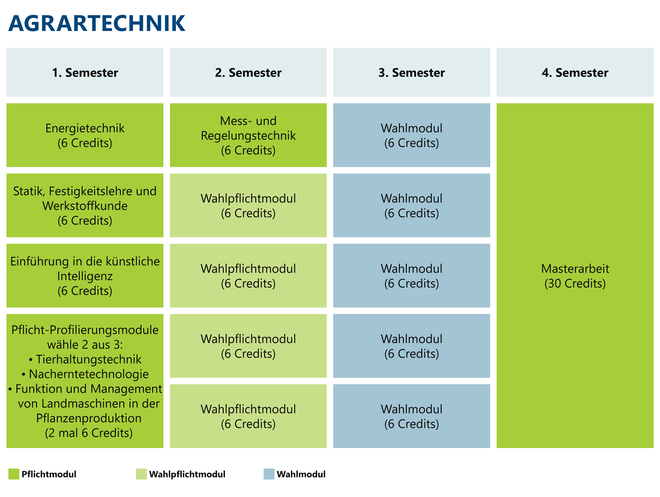
Technology and AI applications for crop production and animal husbandry
The Agricultural Engineering major comprises six modules, selectable from seven compulsory modules with an in-depth agricultural engineering focus (36 credits). In addition, you will also add at least 24 credits from a pool of 11 semi-elective modules with an agricultural engineering focus, e.g. relating to robotics, agricultural machinery, stable construction, or energy systems. If you would like to broaden your horizons, you can additionally choose modules from the compulsory and semi-elective pool in the soil sciences and/or crop production systems subject areas. Ideally, you should complete the compulsory and semi-elective modules in your first year of study. As you progress, you should earn a further 30 credits from elective modules. You can choose elective modules from the entire range of Master's modules offered by the faculty, i.e. including from modules assigned to other Master's programs. If you have a special interest in topics that are not primarily agricultural, you can even choose elective modules from the degree programs offered by our neighboring faculties. If you are interested in a summer school or a stay abroad, this can be easily arranged in the 3rd semester. If you are well prepared, you should have no problem getting your credits recognized.
You would like to know more?
You can download detailed information about the course and structure of the program here:
- Module catalog for Agricultural Engineering
- Examination Regulations
- Academic program advisors
- Institute of Agricultural Engineering
- Faculty of Agricultural Sciences
What you should bring with you
The Master’s degree program in Agricultural Sciences with a major in Agricultural Engineering builds on the knowledge you have acquired in general natural sciences and environmental or agricultural sciences in your Bachelor’s degree program in agricultural sciences or biobased products and bioenergy. If you have a Bachelor's degree in mechanical engineering and are interested in agriculture, then the agricultural engineering subject area is the perfect fit for you. If you have completed one of these Bachelor's degree programs or a related degree program, the Master's in Agricultural Sciences with a major in Agricultural Engineering will really suit you.
The formal requirements for the Master's program are:
- Bachelor’s degree in agricultural sciences, biobased products and bioenergy, mechanical engineering or related subjects from a university in Germany or abroad, or from a university of applied sciences, with a standard period of study of at least 3 years (180 ECTS in total) (for further “related subjects”, see Annex 2 of the Admission Regulations)
- If your final grade or grade point average for that degree is not above average, you can submit separate evidence of your particular aptitude for the program (for details see Admission Regulations § 4).
You should have the following interests and knowledge in addition to the formal criteria:
- Interest in agricultural and technical topics and want to help shape their future
- Practical experience in agriculture/forestry, horticulture, and the environment is an advantage
- Openness to current issues such as climate action, sustainability, and transformation
- Interest in digital agriculture and AI
Preparing scientific results for use by practitioners
The best way to put your knowledge into practice is through an internship, which you can choose according to your interests and integrate into your studies.
Gaining practical experience
You can integrate an internship in an agricultural company or a company in an upstream or downstream sector into the degree program as part of the elective portfolio module.
Acquiring new skills
You will find additional further education opportunities on campus in the form of the F.I.T continuing education courses, the “Artificial Intelligence and Data Science in Hohenheim” (AIDAHO) certificate, or the start-up support in the “Innovation Greenhouse”.
Learning from practice
The degree program offers you numerous opportunities for practical learning. Lectures by practitioners, projects with companies, exciting excursions, and application-oriented projects during your studies give you a direct insight into professional practice and promote your ability to actively apply the knowledge you have acquired.
Strengthening language and intercultural skills
Would you like to improve your language skills? For this purpose, the Language Center at the University of Hohenheim offers various semester and intensive courses that you can take individually during your studies. You can even acquire the UniCert III C1 certificate as part of an elective module. During your studies, you will also acquire intercultural skills naturally by interacting with your fellow students from all over the world.
Researching during your studies
During your studies, you will be able to participate in scientific working groups and gain valuable insights into research practice. By actively participating in research projects, student research projects, and specialized research modules, you become part of the scientific process and acquire qualifications for independent scientific work.
Are you interested in an exchange semester? Make sure to start planning early. A stay abroad is best planned for your 3rd semester. A stay abroad may also be possible as part of your Master's thesis.
We cooperate in research and teaching with 80 partner institutions worldwide, 40 of which are in the ERASMUS program.
The University of Hohenheim’s Office of International Affairs provides extensive information and advice on stays abroad and their financing through scholarships.
What makes our degree program so special?
- Over 700 hectares of experimental fields give you plenty of practical space for your own experiments and research work.
- Nowhere else in Germany can you study agricultural engineering as intensively as in Hohenheim. We are unique in this respect.
- Develop efficient, site-adapted technology and AI applications for plant production and animal husbandry.
- You can choose from a wide range of modules at the Hohenheim Faculty of Agriculture thanks to over 50 professorships. This allows you to get a taste of other subjects (e.g. business administration, organic farming, plant production systems, animal sciences, soil sciences, etc.) in addition to your individual specialization.
- We very much encourage research in national and international projects. We can therefore help you, for example, to join a large collaborative research project or collect data in projects abroad as part of your Master's thesis.
- More good reasons for studying in Hohenheim
Sebastian Biederwolf

I am now at:
Fendt (AGCO GmbH Marktoberdorf)
My position is:
Validation Engineer for forage harvester software testing
I benefited from the following during my studies:
"The opportunity to specialize in agricultural engineering as part of the Master's in Agricultural Sciences has strengthened and broadened my knowledge in this industry. Especially with my Bachelor's degree (Agriculture as a cooperative degree program) as a background, I would describe the advanced studies I completed in Hohenheim as an essential prerequisite for my current career orientation.
Although my Master's studies were subject to the restrictions of the Covid-19 pandemic, I found the program at the University of Hohenheim very diverse. I especially enjoyed the virtual field trips that provided the necessary practical insights in my studies. In addition, I also benefit in my professional life from the independent way of working in
project work, which taught useful soft skills and is optimal preparation for speaking in front of larger audiences."
Nina Berberich

I am now at:
Förster-Technik GmbH
I work there as:
Key Account Manager
I benefited from the following during my studies:
“Through my studies with a specialization in agricultural engineering, I learned above all to organize myself and to work independently. During my time at the university, I was able to improve my ability to tackle projects in a team and solve problems together. Presenting the project work to my fellow students trained my presentation skills, which now serve me well at international training sessions and at trade fairs. The opportunity to carry out my compulsory internships on farms abroad also allowed me to significantly improve my English skills in addition to my practical skills. Especially in an international company, there is daily contact with customers all over the world.”
Mirjam Kleinknecht
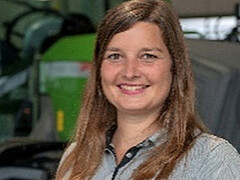
I am now at:
Fendt (AGCO GmbH)
I work there as:
Product Marketing Manager for Tractors and Telescoping Handlers
I benefited from the following during my studies:
“The agricultural sciences program at the University of Hohenheim is very versatile and offers great opportunities through a wide range of elective modules. In addition to the scientific and independent way of working, I particularly liked the hands-on lectures with project work (often in small teams), presentations from the students, and excursions. Besides the technical knowledge, valuable soft skills are taught that are important in professional life."
Isabella Wohlfeld
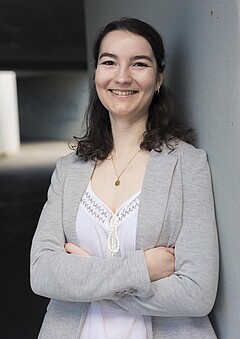
I am now at:
FarmBlick GmbH
I work there as:
Smart Farming Specialist
I benefited from the following during my studies:
"After completing my bachelor's degree "Renewable Resources" at TUM campus Straubing, I decided to pursue a master's degree in "Agricultural Sciences" with a specialization in Agricultural Engineering at the University of Hohenheim. The variety of courses offered allowed me to choose the courses I was most interested in. Particularly I wanted to learn more about Precision Farming and AI. Project work and the internship I was able to count towards my master’s degree were especially helpful during my studies. Furthermore I acquired skills like presenting and structuring which were not only helpful during various internships, but also are needed at my current job. I can also recommend the excursions offered as part of the studies. For Example I took part in a Pentecost excursion with Prof. Böttinger, during which we visited various companies in France, including Claas and John Deere."
Interesting and individual career prospects
In the Master's degree program in Agricultural Sciences with a major in Agricultural Engineering you will develop efficient, site-adapted technology and AI applications for plant production and animal husbandry, and benefit from practical projects with international agricultural engineering companies. You will deal with highly topical issues and help shape the technical transformation in agriculture. If your heart beats for research, you can of course also pursue a scientific career.
After completing your studies, you will have excellent opportunities in both the national and international job markets. Possible fields of activity include:
The following professions are open to you:
- Managing agricultural operations
- Planning and development
- Research and teaching
- Expert appraisals
- Teaching and advising
- Press and public relations
- Quality assurance
- Marketing and sales
- Mechanical engineering
- Development cooperation
- Management or project management
Potential employers include:
- Universities and other research and teaching facilities
- Government agencies in the agricultural and environmental sectors
- Companies in the agricultural, agricultural machinery, environmental, stable construction, and energy plant sectors
- Companies in the supply and mechanical engineering sectors
- Service companies
- Associations or cooperatives in the agricultural, environmental, and ecological sectors
- Organizations active in development cooperation
Topics related to agricultural sciences
- Degree program downloads
- Faculty of Agricultural Sciences
- Student Council for Agricultural Sciences
- Student Council for Agricultural Sciences’ Instagram channel: Important announcements from the Student Council for Agricultural Sciences and information about the Student Council’s activities.
- Master’s in Agricultural Sciences: Mailing list for enrolled students for communicating relevant information
| Admission type | Start of studies |
|---|---|
Without admission restrictions | Winter and summer semesters |
| Application deadlines | |
| Winter semester: 15 September (all). Applications should be preferably made by 15 July so that all enrollment formalities can be completed in time for the start of the program. Summer semester: 15 March (all). Applications should be preferably made by 15 January so that all enrollment formalities can be completed in time for the start of the program. | |
| Requirements | |
|---|---|
| Admission requirements | 1. Bachelor’s degree in agricultural sciences, biology, or related subjects from a university in Germany or abroad, or from a university of applied sciences, with a standard period of study of at least 3 years (180 ECTS in total) (for further “related subjects”, see Annex 2 of the Admission Regulations). |
| Selection procedure | |
|---|---|
| Selection criteria | None, as the number of places is not restricted
|
| It is possible to apply to a higher subject-related semester for the winter semester (application deadline: 15 September) and summer semester (application deadline: 15 March). | |
| Application process | |

